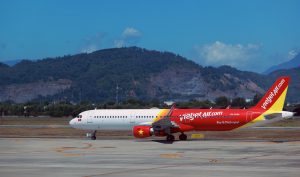Low-cost Philippine airline Cebu Pacific recently announced it had signed a preliminary deal to acquire up to 152 new aircraft from Airbus at a cost of around $24 billion. It represents a big bet on the rising purchasing power of the Filipino consumer class and the fact that they value a good deal. Now VietJet, a Vietnamese airline, has announced its own ambitious expansion plans, entering into an agreement with Airbus to procure 20 A330 widebody aircraft over the next several years. The deal would have a value of around $7.4 billion.
VietJet’s current fleet consists mostly of the Airbus A320 family of planes, which are narrow body and generally intended for short and medium-range routes. The A330 can fly more people for longer distances, and it suggests VietJet wants to expand its international routes and/or simply pack more passengers onto high-demand domestic routes to improve efficiency. Either way, it shows that air travel in Vietnam, and the wider region, has bounced back strongly from the pandemic.
As of 2023, tourism in Southeast Asia had yet to fully recover to 2019 levels (although this year may be the year when it does). But VietJet’s passenger totals already surpassed their 2019 levels, with 25.3 million total passengers in 2023 compared to 23.7 million in 2019. The goal for 2024 is 27.4 million. VietJet’s current fleet is about 87 planes, operating at 85 percent capacity, so there is a clear need for the airline to expand to keep pace with demand.
VietJet is also emerging from the pandemic in a better financial position than its main rival, flag carrier Vietnam Airlines, which saw 1.2 million fewer passengers in 2023 than VietJet did. VietJet has also returned to profitability more quickly, posting a net income of 230 billion dong ($9.3 million) in 2023 after booking a loss in 2022. Vietnam Airlines, meanwhile, saw a loss of around 5.6 trillion dong ($227 million) last year.
VietJet’s more rapid recovery, led in part by a big expansion of its cargo business, has given the airline sufficient confidence in both the air transportation market as well as its own balance sheet to forge ahead with big expansion plans. Moreover, the airline appears to be pivoting toward a longer-term value creation plan with its new acquisitions. According to a press release from Airbus, the current deal will see VietJet buying the planes rather than leasing them. As I’ve written before, owning rather than leasing commercial aircraft has important implications for how airlines operate and their vulnerabilities to external shocks and disruptions to operating cash flow.
The rise of VietJet is especially interesting when considered within the wider context of the Vietnamese economy. Founded in 2011, VietJet is publicly listed and majority-owned by billionaire Nguyen Thi Phuong Thao, the first self-made female billionaire in Southeast Asia, according to Nikkei. It is operating in an economy that is heavily dominated by the state, including its main rival Vietnam Airlines which is majority-owned by the government. Recent efforts by the state to introduce more privatization and pro-market reforms have produced mixed results at best.
It’s interesting that one of the only big private airlines in the country has bounced back so quickly from the pandemic, with improving market share and is now looking to invest in a big upgrade and expansion of its fleet while its rivals struggle to get back to positive earning. I’m not sure exactly what this says about the balance between state and market in Vietnam, but it’s certainly a vote of confidence in the strength of the domestic and regional airline market and a pretty good indication that we are putting many of the lingering effects of the pandemic firmly in the rearview mirror.

































